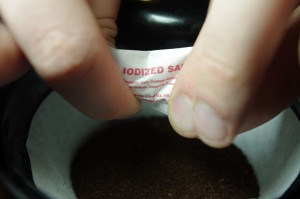When Good Eats’ host Alton Brown did a coffee segment some years back I was surprised at how casual the man who claims to be food’s OCD poster child was about preparing a beverage I know to be among the most finicky and demanding of cooking arts. If his general demeanor convinced me that Mr Brown is not a devout coffee enthusiast, his advice that his special sauce for getting the best coffee taste was adding salt to the grounds sealed it. I was genuinely despondent over the segment. For one thing, it showed he either never saw or wasn’t convinced by my own appearances on Food where I attempted to evangelize good brewing techniques and attentiveness to the process. Second, I was horrified to see him suggest adding salt.
Salt is, according to food medical sages, a slow poison to health. I’m a philosopher when it comes to such warnings. I think a lot of living is eating and, after my early years as a strict food puritan, I came to take a common sense mix of good living and reasonable caution. I don’t smoke or drink heavily. I preach moderation in all things, including salt. By my reckoning a key to long life is learning not to be a health fanatic as worry appears to kill as quickly as the occasional wrong ingredient. So my objection to salt in coffee is not based upon health issues. I acknowledge that salt is not a killer in the amounts advised by Brown.
I’ve also heard food industry critics challenge Brown using the conflict of interest argument. They claim the Brown is funded by a major salt company and thus his views are tainted by his paycheck. Again, I say nay. I think Brown appears to me to be sincere in his beliefs. If I’ve learned one thing in writing about coffee, you’re going to find funding from those you generally agree with and who recognize that what you’re saying is what they want to help spread around. It isn’t always a conflict. It is more often the other way around. The people who want to fund you like you because you both generally agree. I think Brown likes salt and the salt companies simply know this, like this and make their investments accordingly. So, my objection has nothing to do with an impropriety.
I think Alton Brown is wrong, that’s all. Oh, is he right that adding salt to coffee affects the flavor? Yes, he is. But why? Salt is a taste desensitizer. It is roughly the same thing as advising eyeglass wearers to not clean their glasses before viewing their cable TV because it will help cover the artifacts present in video downloads. It’s actually a pretty fair analogy because salt softens the harshness in coffee – coffee that’s poorly brewed that is. Oh yes, it’s also coffee that’s low quality. This is what irks me. Brown, who counsels people to spend extra money and time seeking high quality seafood, meat and vegetables, suddenly offers coffee shortcuts to help hide the defects in inferior beans, and mistakes inherent in poor brewing practices and faulty equipment. Suddenly, the man who’s taught you to cook dinner as if you’re a chef in the most expensive Paris restaurant, is instructing you to brew coffee in a World War II-era Soviet worker’s kitchen. He’s doing all this during an age of comparative coffee bean greatness. I’m befuddled.
Now if I may move upwards from scolding Rachel Ray’s predecessor for a moment, let’s talk about what exactly salt accomplishes in brewing. Salt is a flavor de-hancer. When you go to the supermarket on a Saturday and the cute person handing out tiny wine samples offers you a cube of cheese to accompany it, it is to help the wine by cutting the harshness of a relatively young, inexpensive wine. No wine expert would consider having cheese before or during a wine tasting. More important no one whose spent a hundred dollars or more on a bottle would want to risk destroying their tongues ability to savor that extra fragrance and taste nuances they’ve paid top dollar for. If they do, I can help them save money.
Cheese is called “the winemaker’s friend” precisely because it deadens your taste buds. It may not hurt your experience, but at least know you are like the wealth rock star who learns from a former starlet’s autobiography that he bedded her down. He has no memory of the experience but it must have been wonderful. To me that’s a waste.
Salt does not heighten the flavor of most foods, but limits your ability to taste them. Once you learn this, you are likely to either save money by buying cheaper foods knowing you can reduce the off tastes, or you can begin to really savor them by reducing the salt and allowing your taste buds to really focus on their various flavor essences and aromas.
Ironically, in an age when coffee snobs smirk at seeing their social inferiors adding a dollop of cream to their cups, cream, especially the richer, fattier varieties, can arguably be called flavor enhancers rather than taste deadeners. The challenge here is that the corporate dairies customarily add sodium to cream, probably due to the assumption that a majority of their customers buy poor coffee and don’t know how to brew it.
I urge you to buy direct trade coffees grown by farmers known to your roaster, and brew those coffees within fourteen days of roasting, using the practices I’ve spent years learning and spreading. If you do all this right, you will end up with some of the most exotic and pleasurable aromas and flavors known to man. If you still want to sweeten or enrich them with sugar or cream, be my guest.
But I urge you with equal passion to spare the salt.



Yes, agreed! I also watch Alton on a regular basis, even went to Culinary school with him. Caught that show and was also amazed at his use of salt. BUT….like most of his shows, they are written and produced for the masses to appreciate. With this in mind, there have been many instances where those of us in the food biz would love to ask Alton and his staff members “what were you thinking?”…….
Good catch…..
What do you think about his choice for the best grinder???
His choice was a blade grinder? I thought so and I think a blade grinder is the worst choice to grind coffee. The only possible way to use a blade is to grind so fine it matters less, and the risk that carries is heating up the grounds by overdriving the tiny engine inside a blade grinder. Any grinder that continues to split the bean in two more than once (like a blade does) is prone to poor grind consistency.
My great uncle was an early advertising executive for a major department store in California in the 40’s. He was responsible for displaying (and in those days that meant demoing) coffee makers of the era. He was careful about pure water and the correct grind. But he also threw in egg shells in with the grinds to absorb flavors from the acids. Have you heard of anything like this?
Yes, it is a highly regarded method of clarifying coffee. There’s a variant where an egg, not just the shell, is tossed into a just brewed open pan of coffee, where it supposedly will collect the grounds as it cooks. I’ve not witnessed, nor tried it, but it sounds savory.
@JimmyDThing A Carafe requires a heat source regardless. Drip coffee makers heat the water, the coffee is heated via proxy. The water (as it descends) can be slightly cooled (passively) before contact with the coffee.
Its nearly impsoable to get it fine enough in a food processor. You might wanna start like that then maybe wrap it up in plastic warp put it in a zip lock and try pounding it with a rolling pin or flat headed meat cleaver or something like that. If you still cannot get it fine enough you can always make a cold pressed ice coffee out of it soak it in cold water stirring occasionally for three or four days and you will have a low acid yummy ice coffee to drink
I agree a food processor does not work. It cannot, just as a blade grinder cannot. The only reliable method known of grinding coffee coarse is a single pass between conical burrs.
I’ve done them both – egg shells (before the salmonella scare, mind you) and salt in the coffee but only in office coffee which is generally horrid or will be sitting on the hot plate for hours upon hours. It does cut the bitterness and help pull out the falvours, but if I had my choice, I’d purchase a coffee from a java shop that specializes in – as you mentioned – fair trade or organic coffee where I can get a properly brewed flavour that tickles my taste buds.
If I’m stuck, however, it’s salt or cinnamon to break up the barf.
Cheers,
UD.